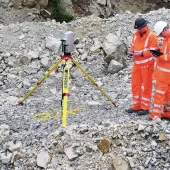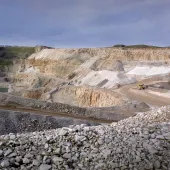Living with Minerals 5 Conference Report

First published in the January 2015 issue of Quarry Management
Conference debates the merits of a UK Minerals Strategy and draws attention to the economic contribution of the minerals industry
‘Towards a UK Minerals Strategy’ was the theme of the CBI Minerals Group’s Living with Minerals 5 (LWM5) conference, which took place in London on Monday 17 November 2014, bringing together all those with an interest in land-won extraction, including coal, industrial minerals and construction minerals. With an active and supporting role from the Mineral Products Association (MPA), the conference debated the merits of a UK Minerals Strategy, as well as drawing attention to the essential contribution of the minerals industry to the UK economy and people’s quality of life.
New findings announced at the event revealed that:
- Minerals extraction generates a turnover of £5.3 billion and £1.6 billion in Gross Value Added (GVA)
- UK minerals, including products manufacture and direct markets, generate a GVA of £217 billion or 15% of the total UK economy
- The minerals industry directly employs 37,000 people and supports 3.2 million jobs through its supply chain.
Given the economic importance of the sector and the fact that it is a long-term industry where it typically takes from five to 15 years to get from site identification to production, a long-term UK Minerals Strategy is seen as key. The recent Department for Business Innovation & Skills (BIS) select committee report on ‘The Extractive Industries’ recommends the development of a ‘domestic extractives plan’ with a BIS Minister responsible for it.
Nigel Jackson, chief executive of the MPA and chair of the CBI Minerals Group, said: ‘Industry wants to lead the development of a Minerals Strategy. We are not seeking government resources or money, but we are hoping for stronger and more material government policy recognition and support.
‘Mineral supplies are critical to national infrastructure, the built environment and the economy, and strategic thinking is needed to help strengthen the sector’s resilience to a complex and uncertain future.
‘Our industry is now better organized, aligned, equipped and less fragmented, and the UK Minerals Forum (UKMF) brings together all key stakeholders and allows us to test the key issues in a constructive way.’
Experts from the UKMF have looked at how to ensure a steady and secure supply of minerals to support the UK’s population and economy in the years to 2050, and their findings and recommendations for developing a shared vision for UK minerals have recently been published in a new report entitled: ‘Future Minerals Scenarios for the UK’, a summary of which was presented at the conference.
The UKMF report has found that:
- Despite the increasing contributions of renewable energy, resource efficiency and recycling, there will be a continuing need to extract minerals in the UK – this requires more effective strategic industrial planning
- The UK faces increasing global competition for raw materials, but future supply cannot be guaranteed in the face of political instability and increasing restrictions on availability
- Uncertainty about the UK’s future relationship with the EU has the potential to affect mineral prices and availability, and industry’s readiness to invest in the UK’s minerals supply chain
- The UK is not self-sufficient in some key minerals, notably metals and increasingly in energy (oil, gas and coal), but does have adequate resources of many non-energy minerals, notably for construction, to 2050 and beyond
- However, long-term access to these minerals is crucial to support an expanding population through sustainable growth of an economy rebalanced towards manufacturing and production – providing more homes, renewed infrastructure and places of employment, low-carbon power generation and enhanced flood protection
- There is an urgent need to resolve the present conflict in UK national policies between securing lower-carbon energy and carbon pricing. This discourages investment in essential mineral-based products such as bricks and cement, drives jobs abroad and exports the UK’s carbon footprint
- Continued access to minerals in the UK should not be at the expense of adverse impacts on the environment. So far the UK has generally been able to secure adequate and steady supplies within a highly protective environmental framework, and with care this should still be possible
- Continuing to meet the UK’s minerals needs as far as possible from UK resources cannot be taken for granted. All those involved – industry, environmental organizations, central and local government, and other regulators – need to work together to develop a long-term national minerals strategy, as an integral part of the UK’s wider industrial strategy.
Stressing the need for a long-term vision and the importance of having a clear minerals strategy to boost the resilience of the UK minerals industry, Lester Hicks, chairman of the UK Minerals Forum, said: ‘We cannot do without minerals for energy, our homes, roads, railways, workplaces, hospitals, flood defence, chemicals and manufacturing. Many minerals, especially for construction, are still obtained in the UK. These would be especially hard and expensive to import. So where we get them is important.
‘This new report shows how dependent we are on minerals, relying more and more on imports in an increasingly uncertain world. But the UK still has significant mineral resources in important sectors of the economy. ‘Future Minerals Scenarios for the UK’ sets out how we can secure these sustainably through a national minerals strategy prepared in collaboration between the minerals industries, central and local government, environmentalists and regulators.’
The LWM5 conference was a full one-day event which featured a facilitated panel discussion session that looked at current developments in the UK, including tungsten, potash, unconventional oil and gas, and the Tellus geophysical project in the South West, and examined the importance of these new developments for the UK’s minerals industry.
A number of high-profile speakers from government, industry and academia spoke throughout the day, including: Iain Stewart, professor of geoscience communication at the University of Plymouth and a leading TV presenter on the geosciences; Sir Mark Walport, the Government’s chief scientific adviser; Ruth Stanier, director of planning at DCLG; and John Cridland CBE, director-general of the CBI.
Speaking after the conference, Mr Cridland said: ‘The need for a strategy that sets out a framework for minerals supply is long overdue, as it sits behind the chemicals industry, glass production, machine tool manufacturing, and is central to the process of energy generation. Minerals are also critical for emerging technologies and essential in supplying the materials needed for our digital infrastructure, among many others. The strategic imperative is clear; without minerals we can’t construct the buildings and other physical infrastructure that we need.’
- Subscribe to Quarry Management, the monthly journal for the mineral products industry, to read articles before they appear on Agg-Net








